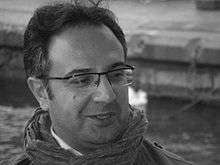Mehmet Hakkı Suçin
Mehmet Hakkı Suçin (born 1970) is a Turkish author, translator and Arabist from Turkey.

Biography
Born in Tuzluca, (then part of Kars), he graduated from Ankara University, Faculty of Letters in 1993. He worked as a translator and interpreter in the Kuwait Embassy to Turkey (1993–1998). He completed his masters thesis on Egyptian novelist and short story author Yahya Haqqi. His PhD was on equivalence problems and strategies in Arabic-Turkish translation and vice versa.
Suçin was one of the team members who produced the semi-dramatic documentary named "Golden Wings: A Story of Courage", sponsored by Turkish Radio and Television Corporation (TRT).[1] He also worked as a visiting fellow at The Centre for Translation and Intercultural Studies, at the University of Manchester.
Mehmet Hakkı Suçin is the moderator of Turkish-Arabic / Arabic-Turkish Translation Workshop (TÜRAPÇAT) under the sponsorship of TEDA Project.[2]
He is one of members of the Judges Committee at The International Prize for Arabic Fiction (IPAF), 2014.[3]
He has published translations of short stories and poetry from Arabic literature in literary periodicals, such as Son Duvar, Edebiyat Güncesi, Kurgan, Dünyanın Öyküsü.
His research interest focuses on Arabic language and literature, translation studies, foreign languages teaching methodology and linguistics. He works at Gazi University in Ankara, Turkey.
Works
Some of his basic publications:[4]
- Öteki Dilde Var Olmak (To Be in Another Language; İstanbul: Say Yayınları, 2013),[5] ISBN 978-605-02-0190-1 listed in Translation Studies Bibliography.
- Dünden Bugüne Arapçaya Çevirinin Serüveni (Translation into Arabic: Past and Today; Ankara: Kurgan Edebiyat, 2012),[6] ISBN 978-975-267-604-6.
- Turkish and Arabic Reduplications in Contrast, Australian Journal of Linguistics, 2010, 30 (2), (209-226).[7]
- Aktif Arapça (Active Arabic); 2009, Ankara: Engin Yayınevi,[8] ISBN 978-975-320-293-0.
- Arabic Curriculum for Secondary Schools in Turkey based on CEFR. Ankara: Ministry of National Education.[9]
- Arabic Curriculum for Primary Education based on the CEFR. Ankara: Ministry of National Education.[10]
- Arap-İslam Kültüründe Yenileşme (Renewal in Arabic-Islamic Culture; co-translated work with Prof. Emrullah İşler from Amin al-Khuli, Kitâbiyât Yayınları, 2006),[11] ISBN 975-6666-43-9.
- Qawâ'id al-Lugha al-Turkiyya li Ghair al-Natiqeen Biha (Turkish Grammar for Arabs; adapted from Mehmet Hengirmen's Yabancılara Türkçe Dilbilgisi;[12] Engin Yayınevi, 2003).
- Atatürk'ün Okuduğu Kitaplar: Endülüs Tarihi (Books That Atatürk Read: History of Andalucia; purification from the Ottoman Turkish, published by Anıtkabir Vakfı, 2001).
- Umm Hâşim’in Lambası (Lamb of Umm Hashim; translated from Egyptian author Yahya Haqqi, published by Ta-Ha Yayınları, 1998).
References
- "Archived copy". Archived from the original on 2011-07-26. Retrieved 2010-01-24.CS1 maint: archived copy as title (link)
- "Archived copy". Archived from the original on 2013-03-20. Retrieved 2013-02-11.CS1 maint: archived copy as title (link)
- "Archived copy". Archived from the original on 2014-02-21. Retrieved 2014-02-19.CS1 maint: archived copy as title (link)
- "Mehmet Hakkı Suçin - Gazi University - Academia.edu". gazi.academia.edu. Retrieved 29 December 2017.
- "Say Kitap". Saykitap.com. Archived from the original on 6 April 2013. Retrieved 29 December 2017.
- Suçin, Mehmet Hakkı (24 February 2012). "Dünden Bugüne Arapçaya Çevirinin Serüveni". Kurgan Edebiyat. Retrieved 29 December 2017 – via KitapYurdu.com.
- "Turkish and Arabic Reduplications in Contrast". Australian Journal of Linguistics. 30: 209–226. doi:10.1080/07268601003678627.
- Suçin, Mehmet Hakkı. "Aktif Arapça [Active Arabic]". Suçin, M. H. (2008). Aktif Arapça [Active Arabic]. Ankara: Engin Yayınevi. Retrieved 29 December 2017.
- Suçin, Mehmet Hakkı. "Ortaöğretim I, II ve III. Yabancı Dil Arapça Dersi Öğretim Programı (Arabic Curriculum for Secondary Schools in Turkey based on CEFR)". Suçin, M. H. et. al. (2012). Ortaöğretim I, II ve III. Yabancı Dil Arapça Dersi Öğretim Programı (Arabic Curriculum for Secondary Schools in Turkey based on CEFR). Ankara: Ministry of National Education. Retrieved 29 December 2017.
- Suçin, Mehmet Hakkı. "İlköğretim Arapça Dersi Öğretim Programı (Arabic Curriculum for Primary Education in Turkey)". Suçin, M.H. et. al. (2011). İlköğretim Arapça Dersi Öğretim Programı (Arabic Curriculum for Primary Education in Turkey). Ankara: Ministry of National Education. Retrieved 29 December 2017.
- Suçin, Mehmet Hakkı. "Arap-İslam Kültüründe Yenileşme [Renewal in Arabic-Islamic Culture]". Academia.edu. Retrieved 29 December 2017.
- Suçin, Mehmet Hakkı. "Qawa'id al-Lugha al-Turkiyya li Ghair al-Natiqeen Biha [Turkish Grammar for Arabs]". Academia.edu. Retrieved 29 December 2017.
External links
- "Mehmet Hakkı Suçin - Gazi University - Academia.edu". Gazi.academia.edu. Retrieved 29 December 2017.
- Başkanlığı, Gazi Üniversitesi - Bilgi İşlem Dairesi. "Websitem". Websitem.gazi.edu.tr. Retrieved 29 December 2017.